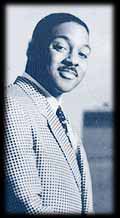
|
|
|
|
|
|
|
Wynton Marsalis
Trumpeter extraordinaire Wynton Marsalis is incredibly well rounded, both on and off the stage. His talent and versatility have earned him eight Grammy Awards in both classical and jazz categories, and he's a bandleader and composer as well. Off stage, he's renowned as an educator and Pulitzer Prize-winning author, and he won a Peabody Award for his groundbreaking NPR Jazz series, "Making the Music". As Dr. Taylor puts it, he's "accomplished more in a decade than many jazz artists have achieved in a l ifetime". The audience at the Kennedy Center greets Marsalis with thundering applause, as he opens the show with a spirited rendition of "Cherokee". Dr. Taylor asks Marsalis about growing up in New Orleans, the "birthplace" of jazz. As Wynton explains, his father Ellis Marsalis played piano in trumpeter Al Hirt's band. In fact, the young Wynton got his first trumpet as a gift from Hirt. Dr. Taylor asks Marsalis to share some of the history of early trumpet players who pioneered the New Orleans style. Starting with Buddy Bolden, the "inventor of jazz", Marsalis gives an enlightening account of influential New Orleans trumpeters, including Freddie Keppard, King Oliver, and Louis Armstrong. Despite his early exposure to the New Orleans jazz tradition, Marsalis admits that he didn't realize its importance until he grew older. As a teen, he was more into fusion, and also liked modern jazz artists like Freddie Hubbard. But Marsalis' New Orle ans roots underlie his musical development, and itís become more apparent as his career has progressed. At Dr. Taylor's request, Marsalis explores these roots again with a solo rendition of "St. James Infirmary". At one point, Marsalis reminisces about playing in the Fairview Baptist Church marching band, under the direction of Danny Barker. Barker used positive reinforcement to help young players realize their potential. Though just eight years old at the time , Wynton says he still remembers how to play all the songs he learned in that band. Perhaps this experience contributes to Wynton's effectiveness as an educator as well. Dr. Taylor inquires about the importance of the famous New Orleans bass drum beat as the foundation of the local style. Marsalis shares a lesson from Barker, who explained, "Now, this bass drum is the key to our whole music". He emphasized the "conver sation" between the drumbeat and responding cymbal crash on the first three beats. On the fourth beat (known as the "big four"), the two are hit together. According to Barker, "when they 'talk' together, that's the most important point". As Dr. Taylor notes, New Orleans has historically been one of the few places where African traditions have continued in America. He mentions celebration (and mourning) with songs and parades, and stepping to a beat. Marsalis feels that some of this he ritage has decayed, but notes that musicians in New Orleans naturally tend to maintain such traditions. A member of the audience asks Marsalis how his involvement with classical music influences his jazz playing, and vice versa. He responds that both genres help to expand his awareness of "what's in the world". Beethoven's music has made a powerful impre ssion on him, and through it he identifies with the great composer's "consciousness". Marsalisí first experience with classical music was with the New Orleans Civic Orchestra. He recalls learning Beethovenís Fifth symphony. It didn't matter that the first rehearsal of the piece "sounded just sad". According to Marsalis, "the music was so great we couldn't destroy it...there's something in this music that will not die...I started to really love that music". Marsalis cautions the audience against comparing classical composers to jazz composers, because the two genres are born of different eras and circumstances. But he notes that Beethoven's music often expresses concepts about humanity and brotherhood, me ssages that reflect those that we often hear in jazz. Staying on the topic of great composers, Billy suggests that Marsalis do his rendition of Duke Ellington's "Caravan." Other songs performed include "Stardust", "Just Friends", and Marsalis' own "Joe Coolís Blues".
|
|
| |
